- Sanitation systems
- Toilets with urine diversion
- UDDTs (urine-diverting dry toilets)
- Reseach Topic Assistance - Otji toilets (UDDTs) in Namibia
Reseach Topic Assistance - Otji toilets (UDDTs) in Namibia
21k views
- Maria123
-
- In Africa, Sharing is Caring
Less- Posts: 5
- Likes received: 0
Re: Article in The Namibian newspaper: Communities unhappy with dry toilet project
So for now I will try to read as much as I can and If I'm to get stucked along the way then I'll let you know.
I will keep you all updated. Since I'm not only here to gain but to also share.
Greetings
Maria
Please Log in to join the conversation.
You need to login to reply- Elisabeth
-
- User is blocked
- Freelance consultant since 2012
Less- Posts: 3372
- Karma: 54
- Likes received: 932
Re: Article in The Namibian newspaper: Communities unhappy with dry toilet project
If I had to pose a research question it would be "what is hampering the upscaling of Otji toilets in Namibia?" - rather than looking at some fine technical details of the toilet...
Perhaps you could even team up with a second student and do it as a tandem: one to look at technical aspects, one to look at policy and institutional aspects.
This paper asked the same question for the case of Omaruru:
Ingle, R., Berdau, S., Kleemann, F., Arndt, P. (2012). What does it take to convince decision makers in Omaruru, Namibia to scale up urine diversion dehydration “Otji toilets”?. 4th International Dry Toilet Conference, Tampere, Finland
www.susana.org/en/resources/library/details/1608
One hyphothesis I have is that the money (grants) from the European Union that seems to be available is always promising flush toilets and sewer systems "soon" so people rather hope for that than go for the simpler and cheaper Otji toilets. Could that be a factor or do I have completely the wrong idea?
Cheers,
Elisabeth
Freelance consultant on environmental and climate projects
Please Log in to join the conversation.
You need to login to reply- Maria123
-
- In Africa, Sharing is Caring
Less- Posts: 5
- Likes received: 0
Re: Article in The Namibian newspaper: Communities unhappy with dry toilet project
Dear Chris
You have given me very interesting ideas regarding my research.
The Research will only be conducted next year, for now I'm just reviewing some literature and getting ideas so that I don't spend much time on this next year hence as they say "the early bird catches the biggest worm.
I've already made arrangements regarding the laboratory, so that is now sorted.
This is really helping a lot. I now have a broad vision of my research.
Please Log in to join the conversation.
You need to login to replyRe: Article in The Namibian newspaper: Communities unhappy with dry toilet project
You would not need a full laboratory. It should be enough to have a microscope (and maybe a centrifuge, depending on the protocol) to look for Ascaris eggs, so maybe there is a Malaria lab or a university that can give you access to a microscope. I think we should optimally work out a protocol that only requires a microscope, as discussed here:
forum.susana.org/forum/categories/26-hea...ce-a-better-way#8176
If the users do not have Ascaris parasitic worms, small envelopes of mesh with feces known to have Ascaris could be added to the toilet, to later be checked.
I would like to mention that there are less expensive dry toilets than Otji Toilets, for example those on my blog, inodoroseco.blogspot.com. Optimally each family should have their own toilet.
Other things you could look at include:
-- How well the urine-separating groove works that was added to the Otji toilet pedestals.
-- User acceptance of UDDTs.
-- Factors why some people do open defecation.
-- Effectiveness of Otji Toilets in avoiding fly reproduction without cover material. (Am I correct that no cover material is used?).
-- Fertilization of crop plants with urine and/or decomposed feces (and percentages of dilution of urine with domestic greywater).
-- Immediate distribution of urine within the soil, via buried perforated hoses (potentially mixed with greywater) and the fruit trees and other crops that best take advantage of this.
It is great that you are doing your project on this. Please let us know how things go and your results.
Best wishes,
Chris Canaday
[End of Page 1 of the discussion thread]
Omaere Ethnobotanical Park
Puyo, Pastaza, Ecuador, South America
inodoroseco.blogspot.com
Please Log in to join the conversation.
You need to login to reply- Maria123
-
- In Africa, Sharing is Caring
Less- Posts: 5
- Likes received: 0
Re: Article in The Namibian newspaper: Communities unhappy with dry toilet project
The dry system is used in poor communities, areas where flush-toilets will be too expensive. The Otji-Toilets are mostly found in the south of Namibia and the rural areas around the Otjiwarongo District.
I hope I have answered your question.
Greetings
Maria
Please Log in to join the conversation.
You need to login to reply- Maria123
-
- In Africa, Sharing is Caring
Less- Posts: 5
- Likes received: 0
It will be quiet costly having to travel back and forth because I didn't receive any funding for my research yet. However it would be interesting though to find out how well it deals with watery diarrhea.
I have visited some of the Otji-Toilet in the south and something I have picked up is that the users are responsible for disposing off the human waste but they are not provided with any area that is designed for that purpose.
Please Log in to join the conversation.
You need to login to replyRe: Reseach Topic Assistance - Otji toilets (UDDTs) in Namibia
Does your University have laboratory facilities you can use to test for example faecal bacteria contamination in the diverted urine? Might be interesting to see how well the system deals with watery diarrhoea and what extra precautions might be necessary before applying the urine as fertilizer then.
Please Log in to join the conversation.
You need to login to reply- Maria123
-
- In Africa, Sharing is Caring
Less- Posts: 5
- Likes received: 0
Next year will be my final year and I will be required to conduct a research in any area relevant to my field of study. I've chosen to focus on water and sanitation in Namibia as that is where I have identified a gab in most of the rural areas. My main focus being on the Otji-Toilets which are recommended for most poor communities in the south of Namibia.
I know what I want to research on but I'm finding it difficult to come up with a topic for my research.
Suggestions on any researchable topic that has to do with sanitation are highly welcomed.
Please Log in to join the conversation.
You need to login to replyRe: Article in The Namibian newspaper: Communities unhappy with dry toilet project
I think especially the last part seems relevant (also to answer the smell issue). These seem to be more or less public toilets (I derive that from the overall numbers and the cleaning issues), and even assumed that everyone uses them correctly and no urine enter the faeces chamber, the moisture will be still too high as the faecal mass has not sufficient time to dry before the drums fills up.
Edit: the less certain urine division in that Otji system (as nice as it seems) probably adds to the amount of moisture also.
But I also don't get the entire point of this construction project... it seems ill considered from the very start, just dropping a few toilets somewhere in the countryside
Please Log in to join the conversation.
You need to login to reply- Elisabeth
-
- User is blocked
- Freelance consultant since 2012
Less- Posts: 3372
- Karma: 54
- Likes received: 932
Re: Article in The Namibian newspaper: Communities unhappy with dry toilet project
www.namibian.com.na/indexx.php?id=16820&...detail&category_id=1
Communities unhappy with dry toilet project
By Theresia Tjihenuna, Ndanki Kahiurika
GOVERNMENT’S plan to construct over 6 500 dry pit-latrine toilets across the country has been greeted with little appreciation from rural community members who stand to benefit, calling the system inferior.
It is not totally clear if all the dry toilets mentioned in this article are Otji toilets but I think at least some of them are. Otji toilets are actually working like UDDTs (urine-diverting dry toilets). See also here on the forum:
forum.susana.org/forum/categories/34-uri...-for-the-otji-toilet
The article says:
Community members in Windhoek’s informal settlements such as Havana and Okahandaja Park also raised concerns over the smell emanating from the dry toilets, especially once the drums are full.
I find this strange because once the drums are full they should be emptied, so full drums should only be there for a day or less. It seems to indicate that once again we have a problem with the maintenance and the faeces drums are not being emptied?
Interesting are also the statements by Kamal Kar quoted in this article:
During his visit to Namibia in April this year, international toilet and sanitation expert Kamal Kar, after interacting with various communities using the system, indicated that the dry toilet system may not be the best option for rural communities.
Kar said that there was a need to explore other options that might be more suited for informal and rural communities, such as Community Led Total Sanitation (CLTS), which is based on the belief that simply providing toilets does not guarantee their use, or result in improved sanitation and hygiene, unless coupled with good hygienic practices in respect of hygiene.
“Communities with flushing toilets seem to be more functional compared to those with dry toilet systems,” Kar said during his observations at Okahandja Park and Havanna settlements. He said although the initiative by government to improve the community’s living conditions in terms of sanitation is good, there was need to involve the community in the decision-making process.
“The dry toilet system does not function well for a number of reasons, especially the smell. Dry toilet systems are only sustainable in that they save water,” he said.
Whether or not he was quoted correctly by the journalist, I am not sure. I would find such sweeping statements by him a bit strange - maybe the journalist exaggerated them a bit. Or maybe Kamal Kar advocated CLTS followed by building of pour flush toilets?
Anyhow, would be interesting to hear from people who know a bit more about the situation with sanitation, open defecation, behaviour change and dry toilets in Namibia?
Regards,
Elisabeth
Freelance consultant on environmental and climate projects
Please Log in to join the conversation.
You need to login to reply- Elisabeth
-
- User is blocked
- Freelance consultant since 2012
Less- Posts: 3372
- Karma: 54
- Likes received: 932
Re: Waterless toilets for informal settlements in Namibia
Nobody answered your question yet, probably because you didn't introduce yourself... Please tell us more about your work.
If you are in Namibia then you must know the Otji toilets which are a variant of the urine-diverting dry toilets (UDDTs).
We have a nice SuSanA case study here with many useful links at the back:
susana.org/lang-en/case-studies?view=ccb...eitem&type=2&id=1186
Or see: www.susana.org/library?search=Otji
Some photos for illustration (see more here: www.flickr.com/search/?w=23116228@N07&q=otji)
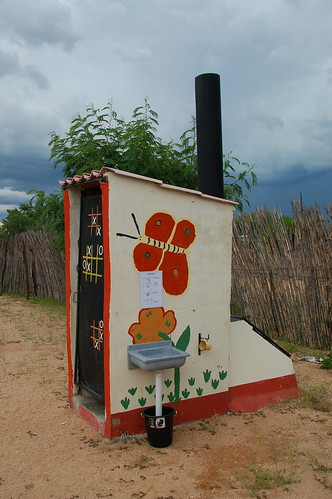
Urine-diverting dry toilet at a Kindergarten in Omaruru, Namibia (also called Otji toilet there) (high resolution photo) by Sustainable sanitation , on Flickr
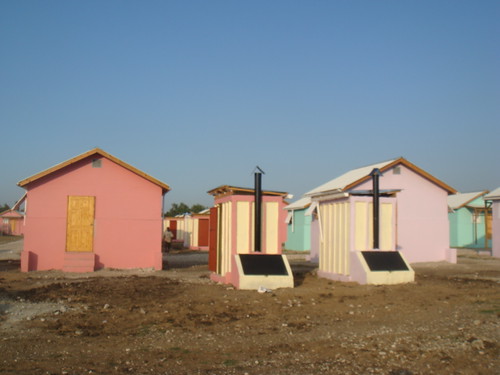
Otji toilets in "Carter work project " by Sustainable sanitation , on Flickr
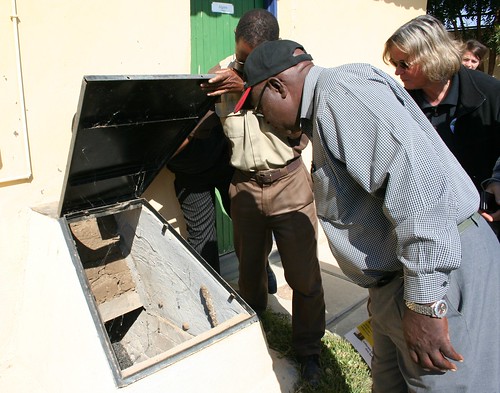
Faeces check by Sustainable sanitation , on Flickr
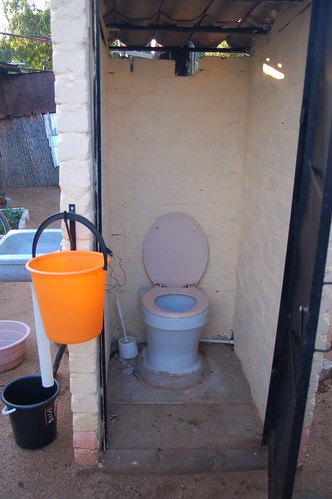
Inside the toilet with open lid by Sustainable sanitation , on Flickr
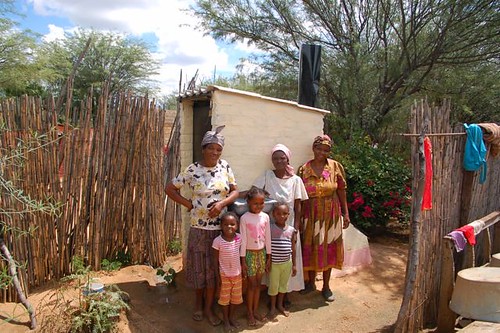
Proud owner II by Sustainable sanitation , on Flickr
And then there is also a research project in Namibia funded by the German government called Cuve Waters. It is probably not so relevant for you, because it is pretty high tech:
www.cuvewaters.net/Sanitation-and-water-reuse.21.0.html
Has this information helped you?
As I said, please tell us more about your work.
Regards,
Elisabeth
Freelance consultant on environmental and climate projects
Please Log in to join the conversation.
You need to login to reply- Guiobhe
-
Less
- Posts: 1
- Likes received: 0
Re: Article in The Namibian newspaper: Communities unhappy with dry toilet project
I am writing from Namibia. I come from community development background. Could you please refer me to examples where waterless toilets are in use in informal settlements.
Harold
Please Log in to join the conversation.
You need to login to reply- Sanitation systems
- Toilets with urine diversion
- UDDTs (urine-diverting dry toilets)
- Reseach Topic Assistance - Otji toilets (UDDTs) in Namibia








